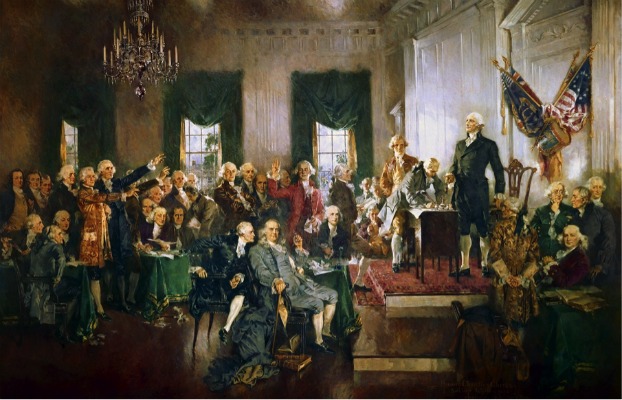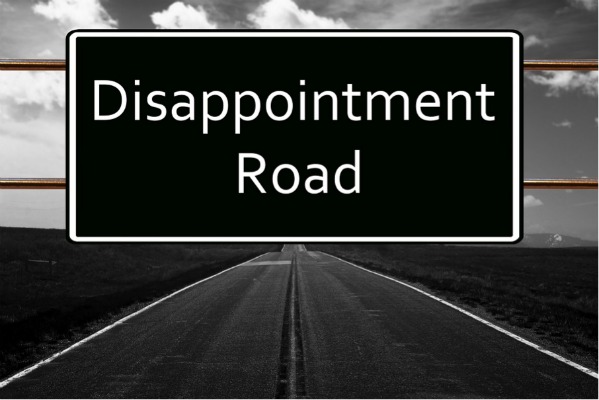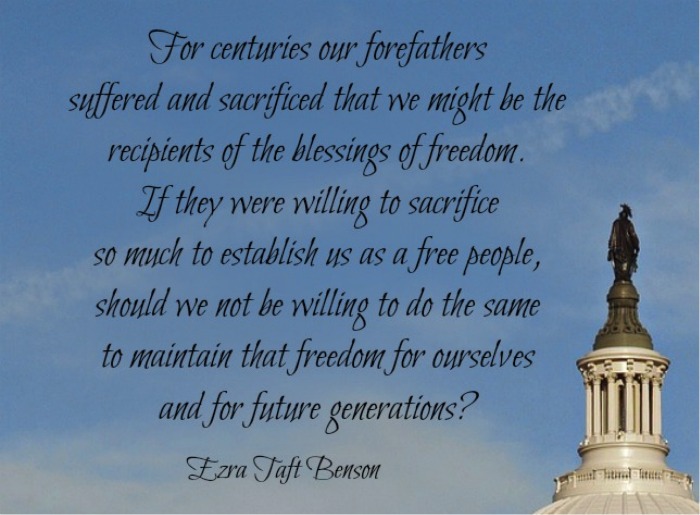Disappointment and Democracy in America
Opinion
The 2016 presidential election is one for the history books. Election night was a nail-biter until well after midnight, and it seems like the surrounding controversy just won’t end. From the multi-state recount effort to petitioning Electoral College electors to change their votes to calling for the Mormon Tabernacle Choir to cancel their performance at President-elect Donald Trump’s inauguration, his detractors just won’t quit.
Election drama is nothing new. Every four years, we have a presidential election. And every four years, one candidate wins and the other one loses. Sometimes the races are incredibly close, and five times since 1824 (when the popular vote was first recorded) the President-elect lost the popular vote but won the election because of the electoral college—this election being the latest.
But this time around the attempts to overturn the election results have been downright disconcerting. As an American and a member of The Church of Jesus Christ of Latter-day Saints, I have a healthy respect for democracy and the Constitution and the role that both play in the freedoms that we enjoy. If we cannot uphold the former, then we risk losing the latter.
This is especially important to remember in the aftermath of a presidential election as contentious as this one. While it might seem a good idea at present, each time we try to circumvent the due process of Constitutional law, we weaken our nation. What we need to do is learn to live with disappointment in a democracy— and how to move forward in spite of it. So how do we do this?
Upholding the Constitution

The first step in moving forward is to look back. Too many of us take our Constitution and our system of government for granted, then complain when things don’t work as we think they should. We need to fully understand our Constitution and the protections therein to appreciate and support it. Elder L. Tom Perry said,
No constitution on earth has endured longer than ours. We seek and usually find the answers to today’s hardest legal questions within this document of yesterday. The Constitution was and is a miracle. Both Washington and Madison referred to it as such. It was an inspired document, written under the divine guidance of the Lord. James Madison, commonly called the Father of the Constitution, recognized this inspiration and gave the credit to “the guardianship and guidance of the Almighty Being whose power regulates the destiny of nations whose blessings have been so conspicuously displayed to the rising of this republic” (Prologue, p. 95). We believe that the Constitution was brought about by God to insure a nation where liberty could abound, where his gospel could flourish. Joseph Smith said, “The Constitution of the United States is a glorious standard; it is founded in the wisdom of God. It is a heavenly banner” (Teachings of the Prophet Joseph Smith, p. 147).
Modern prophets have emphasized the importance of upholding and sustaining the Constitution of the United States. They also foresaw the day when it would be in jeopardy. The Prophet Brigham Young said,
Will the Constitution be destroyed? No: it will be held inviolate by this people; and, as Joseph Smith said, “The time will come when the destiny of this nation will hang upon a single thread. At that critical juncture, this people will step forth and save it from the threatened destruction.” It will be so (Journal of Discourses, 7:15).
As Americans, each one of us has the responsibility of stepping up and doing our part to strengthen our nation and uphold the Constitution. It’s difficult to know if this prophecy by Joseph Smith has been fulfilled or if the day is still coming. D. Michael Stewart, who at the time taught history at Brigham Young University, explained,
Since no particular time was given for fulfilling this prophecy, members of the Church have often wondered about its timing. The prophecy clearly indicates a single, identifiable episode yet to come. However, it is helpful for us to constantly be on guard against threats to the central elements of the Constitution. It is not wise to sit by and think that the protection of the Constitution is the problem of someone else at some other time.
But to defend this document we must study it. President Ezra Taft Benson said,
… We must learn the principles of the Constitution in the tradition of the Founding Fathers.
Have we read The Federalist papers? Are we reading the Constitution and pondering it? Are we aware of its principles? Are we abiding by these principles and teaching them to others? Could we defend the Constitution? Can we recognize when a law is constitutionally unsound? Do we know what the prophets have said about the Constitution and the threats to it?
As Jefferson said, “If a nation expects to be ignorant and free … it expects what never was and never will be” (Letter to Colonel Charles Yancey, 6 Jan. 1816).
Before we jump on the bandwagon of changing our government, we need to learn why it was set up this way in the first place. And when we do, we can more fully appreciate the foresight, thought and inspiration that went into this divinely inspired document.
Refining the Constitution
This isn’t to say that the Constitution is a rigid document that can never change. It has already changed and evolved through time. Noel B. Reynolds, at the time chairman of the Department of Philosophy at Brigham Young University, explained,
… The founders of the American Republic did not see the Constitution as a final document. They clearly recognized it as a step of unprecedented magnitude but they expected it to be revised and refined over the years. They deliberately provided for orderly changes by including in the document itself an amendment procedure. This amendment procedure was used first to establish freedom of religion, freedom of speech, and other essential liberties. It has since been used to prohibit slavery, provide full citizenship to all Americans, protect individuals from invasions of their liberty by agencies of state governments, and extend voting rights to females.
President Brigham Young once declared that both the signers of the Declaration of Independence and the framers of the Constitution “were inspired from on high to do that work.” But he then went on to ask, “Was that which was given to them perfect not admitting of any addition whatever?” His answer was a clear negative. He said the founders “laid the foundation, and it was for after generations to rear the superstructure upon it. It is a progressive—a gradual work” (Discourses of Brigham Young, 1925 edition, p. 550).
The Power in Democracy
We tend to see democracy in parts and pieces rather than as a whole— such as during elections when we vote our conscience. But it’s so much more than that. Jean Bethke Elshtain, at the time a professor at the University of Chicago Divinity School, said,
… Democracy is not and has never been primarily a means whereby popular will is tabulated and enacted but, rather, a political world within which citizens deliberate, negotiate, compromise, engage, and hold themselves and those they choose to represent them accountable for actions taken. Have we lost this deliberative and dialogical dimension to democracy? For democracy’s enduring promise is that democratic citizens can come to know a good in common that they cannot know alone (Democracy at Century’s End, BYU Speeches, October 29, 1996).
Democratic citizens come to know this good in common by working together to create it. One problem is that fewer and fewer citizens are participating. Professor Elshtain said,
Alexis de Tocqueville, in his classic work Democracy in America, argued that one reason the American democracy he surveyed was so sturdy was that citizens took an active part in public affairs. This is important because participating in public affairs means one must move from exclusive and narrowly private interests and occasionally take a look at matters that concern others. In Tocqueville’s words,
As soon as common affairs are treated in common, each man notices that he is not as independent of his fellows as he used to suppose and that to get their help he must often offer his aid to them. [Alexis de Tocqueville, Democracy in America, ed. J. P. Mayer, trans. George Lawrence (New York: Harper Perennial, 1988), p. 510]
In this way civic engagement helped to underscore what Tocqueville called “self-interest properly understood,” an interest that was never narrowly focused on the self (p. 526). If Tocqueville were among us today, he would no doubt share the concern of social scientists who have researched the sharp decline in participation. They argue that the evidence points to nothing less than a crisis in “social capital formation,” the forging of bonds of social and political trust and competence. The debilitating effects of rising mistrust, privatization, and anomie are many. For example, there is overwhelming empirical support for the popularly held view that where neighborhoods are intact, drugs and alcohol abuse, crime, teenage childbearing, and truancy among the young diminish. Because neighborhoods are less and less likely to be intact, all forms of socially and self-destructive behavior among the young are on the rise. Americans at the end of the 20th century suffer from the effects of a dramatic decline in the formation of social bonds, networks, and trust.
This atmosphere of mistrust in each other is one of the biggest problems that we have. If we don’t trust our neighbors’ judgment, then it’s no wonder that we have problems working things out. Democracy isn’t about the individual, nor is it solely about socialist agendas. Rather, it is about each individual doing his or her part to make the community, state and nation a better place.
We do this by first setting aside our differences, finding common ground and working together for the common good. But this brings me to my next point: Sometimes the common good that is created isn’t good for everyone. And that is where we must learn to deal with disappointment.
Dealing with Disappointment

We take to the polls every four years to vote for our president. And each time, one candidate is elected and the other isn’t. There is always a section of the population unhappy with the chosen candidate. And presidential elections in recent decades have been won by very narrow margins.
Take, for example, the 2012 presidential election, where Barack Obama won with 51% of the popular vote. That left 49% of the nation displeased with the outcome. The current attitude appears to be that if you don’t like the outcome, do everything in your power to overturn it. This seems to me to be an awful lot like a revolt. And while the beauty of our American democracy is that we have the ability to make our voices heard, when do our actions become a hindrance to our nation? And when really is a revolution necessary? Richard L. Bushman, at the time professor of history at Boston University, explained,
The question of when revolt is justified was dealt with in our most revolutionary document, the Declaration of Independence, authored by Thomas Jefferson. The first part of the document is the portion we are most familiar with. It declares that governments are constituted for the purpose of protecting human rights and when they fail in that purpose they are to be overthrown and reconstituted. That was the ideological basis of our revolution.
However, Jefferson did not stop there. He went on to deal with the question of how you determine when revolution is justified since obviously you cannot resort to such drastic measures whenever you feel mistreated. As he said, “Prudence indeed, will dictate that governments long established should not be changed for light and transient causes. …” Men wisely suffer some evils rather than “right themselves by abolishing the forms to which they are accustomed.”
When should a people go to the extremity of revolt? “When a long train of abuses and usurpations, pursuing invariably the same object evinces a design to reduce them under absolute despotism, it is their right, it is their duty to throw off such governments. …” The key word was design. Mere incompetence was not enough. Mistakes had to be tolerated. It was only when the will of the sovereign aimed specifically at destroying all the rights of a people and reducing them to slavery that revolution was justified. …
So if revolution isn’t the answer, then what is? The First Presidency and Quorum of the Twelve Apostles of The Church of Jesus Christ issued a statement following the election that offers insight. They said,
We congratulate President-elect Donald Trump on his election as president of the United States.
We invite Americans everywhere, whatever their political persuasion, to join us in praying for the president-elect, for his new administration and for elected leaders across the nation and the world. Praying for those in public office is a long tradition among Latter-day Saints. The men and women who lead our nations and communities need our prayers as they govern in these difficult and turbulent times.
We also commend Secretary Hillary Clinton and all those who engaged in the election process at a national or local level. Their participation in our democratic process, by its nature, demands much of those who offer themselves for public service. May our local and national leaders reflect the best in wisdom and judgment as they fulfill the great trust afforded to them by the American people.
The best way to deal with disappointment is to take the high ground and support those who have been elected. We need to understand that political elections are a means to an end and not the end of the road. They are the means by which we create a stable system of government.
The Road to Compromise

At the end of the day, we must learn to work together and compromise. Compromise plays an important role in our system of government. Wallace F. Bennett, a retired United States Senator from Utah, said,
… We need to learn the true meaning of the word “compromise,” which is “a mutual promise.” It properly describes an agreement reached through mutual concessions, or an acceptable adjustment between conflicting ideas or desires. It may also require the presence of a third or disinterested party as arbiter.
There are those who maintain that any compromise is evil or shameful because it may involve some surrender of “principle” or freedom. Unfortunately, my years in the Senate have taught me that those who talk of “principle” in this context really mean “interest”—their self-interest. Nor is compromise a true diminution of one’s freedom or free agency, because the scriptures are full of admonitions to use our freedom in the service of others and not for our selfish ends. Christ said, “Agree with thine adversary quickly” (Matthew 5:25).
Because conflicts and disagreements are natural experiences in the lives of everyone, the search for a solution through “a mutual promise” is natural and praiseworthy.
It is through compromise that we learn how to work together and get things done. Bennett continued,
… Compromise is an important element in lawmaking, the search for a combination of ideas that will not only provide the highest level of satisfaction for each and all of the groups whose interests are in conflict, but also, of necessity, attract the support of the needed majority to get the bill passed.
The same is true for the rest of us. We need to work together and compromise to create a safe and stable community. We do this by working within the bounds of democracy and our Constitution, not by railing against it. That is how we make America great.


